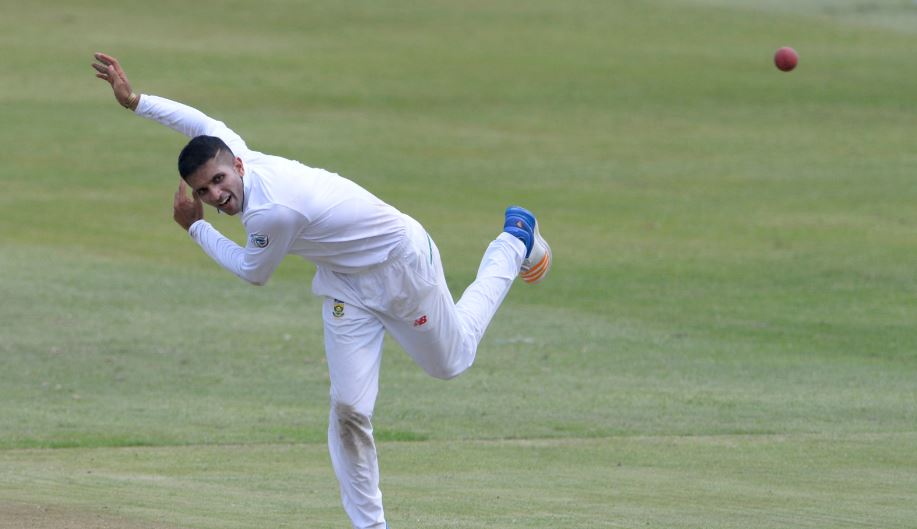Proteas head coach Mark Boucher says the wicket in Karachi is likely to spin far more than it has historically, explaining that reverse swing may not be a factor.
When Boucher last toured Pakistan as a player in 2007, the Pakistan wickets were the least spin-friendly on the sub-continent.
The Proteas bowlers relied heavily on reverse swing when the ball – scuffed up from an abrasive deck and outfield – got older. This brought the likes of Dale Steyn into focus, and the Proteas were fully expecting Kagiso Rabada to play a similarly pivotal role this time around.
This isn’t the case 14 years later. Instead, conditions are now expected to cast the spinners as the primary match-winners, and Boucher confirmed they will ‘definitely play more than one spinner’ in Karachi on Tuesday.
‘We always revert back to our seaming options because that’s what we get grown up to think,’ Boucher said. ‘But if it looks like it’s going to turn, we must make the right selections and make good cricket calls. I encourage an open mindset rather than going back to the norm. It’s a two-match series, so we can’t go one down and have regrets that we should have played an extra spinner. We’ve got to make the call right now. We’re coming with a mindset that if we want to win a series away from home, we’ve got to make a couple of brave calls.’
The Proteas have three spinners to select from, with Keshav Maharaj a certain pick. George Linde and Tabraiz Shamsi will contest the second spot, and Boucher hinted the former had the inside lane.
‘Tabraiz has been selected as an attacking, aggressive spinner. If you get given the opportunity to give him a chance in spinning conditions, then why not?’ Boucher asked.
The issue of reverse swing loomed large over the series, but Boucher said that upon inspection of the wicket and outfield, they’ve concluded that it would not be as big a factor as initially thought.
‘We spoke about reverse swing but having gone to the ground only recently, we found the outfield was very green and quite moist. I don’t know how big a weapon reverse swing is going to be,’ Boucher said. ‘The conditions are going to be proper sub-continent conditions and I don’t think there will be a lot of assistance for seamers. Not only is the weather a lot cooler, but the conditions are not what I became used to [when touring here] in the past – the lush green outfields.’
Boucher and the selectors now have a tough decision to make on which bowlers play. Maharaj and Rabada are the only certainties, while another spot is reserved for a second spinner. This leaves them to pick two bowlers from a group that includes all-rounder Wiaan Mulder, and seamers Lungi Ngidi, Lutho Sipamla, Beuran Hendricks and Anrich Nortje.
Picking Shamsi in place of Mulder leaves the Proteas with a lengthy tail. If Mulder is excluded, it is likely to be for Linde, who is highly competent with the bat.
The more likely scenario is that a fast bowler is dropped. Nortje’s form, pace, endurance and greater experience is likely to earn him a place, while Lutho Sipamla’s showing against Sri Lanka should edge him ahead of Ngidi.
Meanwhile, Boucher says he has challenged the batting unit to dominate consistently and score big hundreds. This is a point of concern, given that the unit features a clutch of players who have been woefully inconsistent.
Aiden Markram averages just 10.50 across eight innings on the sub-continent – this includes three ducks. Quinton de Kock has played 10 innings on the sub-continent, averaging 20.90. He hasn’t scored a Test century in 15 innings. Temba Bavuma hasn’t scored one in 63 innings, while Rassie van der Dussen hasn’t score a century in any of the 10 Test innings he’s played.
Boucher said these players are fully aware of expectations and added that they were targeting significant first-innings contributions.
‘A big first-innings score will always be a bonus, because once you get that you get in control of the game,’ Boucher said. ‘The wickets are generally pretty good for the first two or three days and then once you start getting a bit of rough, the ball starts turning. The game tends to speed up towards the end of the game, so first-innings runs are important.’







